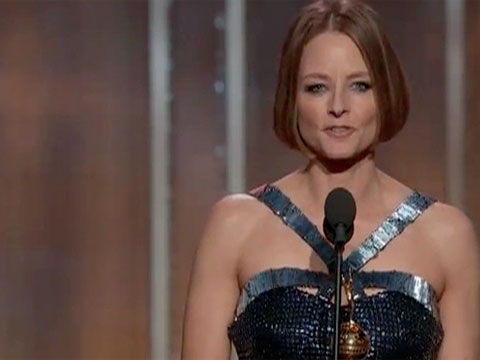As THE WORLD knows by now, Foster gave a now-legendary monologue while accepting the Cecil B. DeMille Award for lifetime achievement at the Golden Globes on Sunday. (At this point, my much put-upon editor is doubtlessly grumbling, ‘WELL THEN, WHERE WAS THIS REACTION PIECE ON MONDAY?’ Touché.)
[related_content slugs=”the-horror-of-lena-dunhams-average-body,when-did-gorgeous-thin-women-who-subsist-on-junk-food-become-such-a-thing-on-tv,the-patriarchy-is-also-ruining-web-comics” description=”More SCREAMING” position=”right”]
Since it’s Thursday, lots of ink has already been spilled about the strange, semi-terrifying ramble that prompted K.D. Lang to Tweet simply ‘?’ (You know, because all gay celebrities are expected to have an opinion about other gay celebrities… OOPS! SPOILER!)
It really was something else. It also covered a lot of ground and sometimes didn’t make sense. My take-home messages were as follows: Jodie Foster is still gay (she actually came out in 2007) but really wants to remind me of that RIGHT NOW; Jodie Foster is 50; Jodie Foster really values privacy; and JODIE FOSTER IS NOT HONEY BOO BOO CHILD.
A seven-minute, hyper-personal confessional from someone as private as Jodie Foster is surprising (and confusing) considering that this is someone who, as she helpfully reminded us, has been in the public eye since she was three. She’s fought hard to maintain that privacy and she’s done a good job, too; what struck me was the realization of how little I know about Foster’s personal life, when I know so much about, say, Kim Kardashian’s — AND I DON’T EVEN HAVE TO ACTIVELY TRY. Maintaining some semblance of separation between public and private is no small feat; if you’re a public figure — and particularly if you’re a female public figure — not much of your personal life is personal. Privacy is a luxury in a tabloid culture. You got that part right, Jodes.
Foster’s speech got me thinking about how much we expect from our celebrities. Here we are now, entertain us — onscreen and off. We want them to be accessible to us, and feel like we know them (see: Twitter). We want to know about everything their lives while pretending we don’t care. We want to know who they’re boning. We want them to be beautiful and thin, but not too thin. We take delight in watching the trainwrecks. We put the good girls, the ones who stay out of trouble and, by extension, out of the pages of gossip rags, on pedestals, and we practically point and laugh at the troubled Lindsay Lohans of the world. We slut-shame and body-snark on Worst-Dressed lists. It’s so easy to forget that these are HUMANS. WITH FEELINGS.
They’re also humans with incredible influence and visibility. In Foster’s case, she’s expected to be a role model because of her sexuality, which is why her ‘coming out’ — or lack thereof — has been met with some disappointment, mostly due to the fact it didn’t come sooner. As Patrick Strudwick writes in The Guardian, “Without visibility we would have nothing. Without millions of ordinary people, kids in British state schools, activists in Uganda, married Christians in the Bible belt, saying, ‘Actually, I’m gay,’ Jodie Foster would not be able to stand up, resplendent, creaking open the closet door free of consequences. She surfed the wave of others’ courage and gave back only when she felt like it.”
Maybe — or maybe only now did Jodie feel comfortable assuming that mantle as a celebrity and maybe that’s what the speech was about. Maybe she was just trying to show us Jodie Foster, the human with feelings. (And boy, was she clearly feeling some feelings on Sunday night.)
Or maybe she was just really drunk.
__
Jen Zoratti is a Spectator Tribune columnist and a freelance music scribe. She still doesn’t really know what to make of that speech, Follow her on Twitter @JenZoratti.
